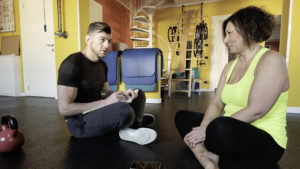Behavior Change
January Momentum Is Built on Clarity, Not Motivation
January is often treated as a test of motivation; for clients AND for fitness professionals. Energy is high, goals are ambitious, and expectations tend to escalate quickly. Yet experience and…
Behavior Change Check-Ins: A Smarter January Reset
January often brings renewed energy both for clients and fitness professionals alike. But it can also bring pressure. Expectations rise quickly, routines shift abruptly, and many clients feel an unspoken…
From Consideration to Commitment
Many individuals who seek out fitness facilities, consultations, or assessments are not undecided about whether physical activity matters. They are undecided about whether structured support is necessary, appropriate, or sustainable…
Harnessing the Power of Visualization to Stay Committed to Your Fitness Routine
When you’re trying to stick with a fitness program; whether it’s working out three times a week, going for 10,000 steps a day, or hitting the weights consistently, motivation and…
The Psychology of Seasonal Motivation
September is often described as the “second January” in the fitness world, bringing a wave of renewed motivation. Behavioral scientists have identified this as the “fresh start effect”. These are…
How Much Exercise Do You REALLY Need to Stay Healthy?
Clearing Up the Confusion Between social media fitness trends and ever-evolving health advice, it’s easy to feel overwhelmed about how much exercise is truly necessary to stay healthy. Do you…
Taking Care of Ourselves and the Planet
A New Way to Think About Wellness Sustainability isn’t just about recycling or using less plastic anymore. It’s become a way of thinking about all the choices we make—including how…
Social Connectedness, Strengthening Bonds, Strengthening Health
The fundamental human need for social connection is as intrinsic as the need for food and shelter. This innate desire to form meaningful relationships profoundly influences overall health and well-being….
Using Behavior Change Science to Enhance Fitness and Wellness Coaching
Understanding the science of behavior change is pivotal for fitness professionals aiming to foster lasting health improvements in clients. Despite widespread awareness of the benefits of regular physical activity, many…
How Long to Form a New Habit?
New exercisers face the challenge of sticking with a new activity program. Personal trainers are all too familiar with clients who quit when they don’t experience fast, visible results. Sharing…
Weekend Warriors Reap Benefits
New research shows benefits of one or two days a week of concentrated physical activity. Weekend warriors rejoice. Formerly, experts viewed weekend only training as less valuable than consistent exercise…
Self-Compassion Aids Weight Loss Efforts
New research suggests that self-compassion increases a person’s self-control over exercise and eating behaviors.
Health Coaching: Behavior Change Strategies
We need to look at ourselves as change agents and implement the following behavior change strategies to help our clients.
Athletes and Irrational Beliefs
Many competitive athletes hold irrational beliefs and self-judgmental thoughts that lower self-confidence and increase competitive anxiety.
Mindset and Menopause
There’s no arguing about the benefit and importance of physical activity for our health, especially during menopause. And that’s only the starting point: Women transitioning through menopause benefit from a…
Exercise After Eating and Muscle Mass
New research shows that exercise after eating improves the body’s ability to use dietary amino acids to synthesize protein into muscle mass.
Fit Tech Data for Coaching Success
Wearables and the fit tech data they produce have become an opportunity to deepen the client and fitness professional relationship.
Influencing Childhood Activity
Researchers studied influences over children to lead physically active lives, since childhood activity results in better health as an adult.
Hypnotherapy for Behavior Change
Blink Fitness has created Gymnosis™, a hypnotherapy program to help motivate people to start and continue exercising.


















